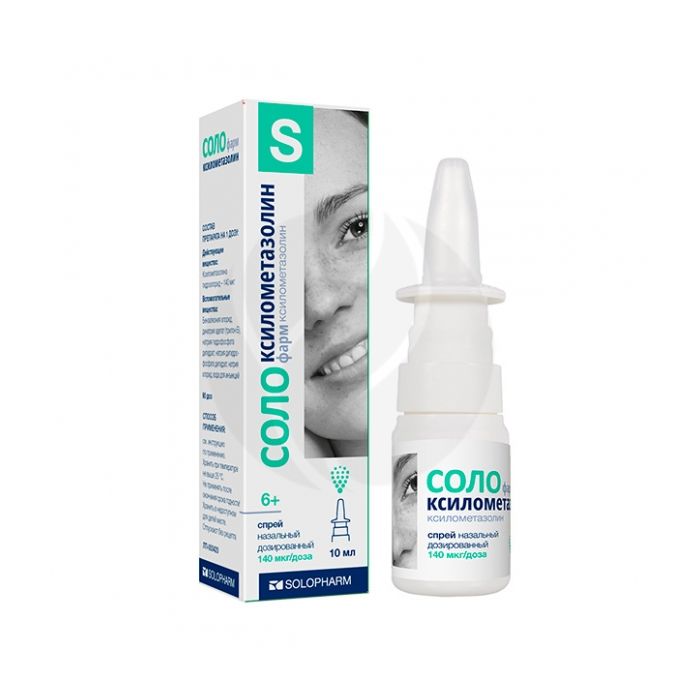Xylometazoline Solofarm spray 0.1%, 140mkg / dose 10ml
Expiration Date: 11/2025
Russian Pharmacy name:
Ксилометазолин Солофарм спрей 0,1%, 140мкг/доза 10мл
Acute respiratory diseases with symptoms of rhinitis (runny nose),
acute allergic rhinitis,
hay fever,
sinusitis,
eustachitis,
otitis media (to reduce swelling of the nasopharyngeal mucosa).
Preparing the patient for diagnostic manipulations in the nasal passages.
Adults and children over 6 years of age: 1 injection, nasal spray dosed at 140 mcg / dose in each nasal passage (if necessary, you can repeat it); should not be applied more than 3 times a day. If symptoms worsen or do not improve within 3 days, you should consult your doctor. In the recommended dose, without consulting a doctor, use for no more than 7 days. Doses higher than recommended can only be used under medical supervision. With frequent and prolonged use of the drug, the feeling of 'stuffiness' in the nose may reappear or worsen. If these symptoms appear, you should stop treatment and consult a doctor.
xylometazoline
- hypersensitivity to the components of the drug;
- arterial hypertension;
- tachycardia;
- severe atherosclerosis;
- glaucoma;
- atrophic rhinitis;
- thyrotoxicosis;
- surgical interventions on the meninges (in history);
- conditions after transphenoidal hypophysectomy;
- children under 6 years of age - for xylometazoline, nasal spray dosed at 140 mcg / dose;
- pregnancy.
Do not use during therapy with monoamine oxidase inhibitors and tricyclic antidepressants (including a period of 14 days after their withdrawal).
pharmachologic effect
A vasoconstrictor for topical use in ENT practice. Alpha adrenergic agonist. When applied to mucous membranes, it causes narrowing of the blood vessels of the nasal mucosa, thus eliminating edema and hyperemia of the nasal mucosa, restores the patency of the nasal passages. With rhinitis, it makes nasal breathing easier.
Pharmacokinetics
When applied topically, it is practically not absorbed, plasma concentrations are so small that they cannot be determined by modern analytical methods.
Side effects
With frequent and / or prolonged use - irritation and / or dryness of the nasopharyngeal mucosa, burning, tingling, sneezing, hypersecretion of the nasopharyngeal mucosa, hypersensitivity reactions, swelling of the nasal mucosa, palpitations, tachycardia, arrhythmia, increased blood pressure, headache , nausea, vomiting, insomnia, visual impairment, depression (with prolonged use of high doses).
If any of the side effects indicated in the instructions are aggravated or you notice any other side effects not listed in the instructions, inform your doctor.
Interaction
Xylometazoline should not be used in patients receiving therapy with monoamine oxidase inhibitors and tricyclic antidepressants (including a period of 14 days after their withdrawal) due to the possibility of increased blood pressure.
Overdose
Symptoms: increased side effects (dose-dependent), decreased body temperature, confusion. In case of accidental ingestion, the drug can cause: severe dizziness, increased sweating, headache, bradycardia, increased blood pressure, respiratory depression, coma and convulsions. After an increase in blood pressure, a sharp decrease can be observed.
Treatment: symptomatic.

